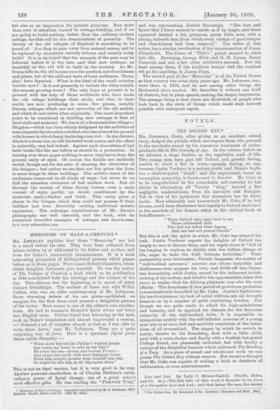NOVELS.
THE GOLDEN KEY.*
Ma. DESMOND CORE, after giving us an excellent school story, dodged the pitfalls which encompass those who proceed to the inevitable sequel by his ingenious treatment of under- graduate life in The Comedy of Age. In the volume before us we advance a stage further on the regulation road of life.
Two young men have just left Oxford, and, greatly daring, resolve to share a fiat in town,—greatly daring, we say, because Justin Verderer is a serious youth and Dennis Ingle-
ton a shallow-pated "blood," and the experiment, based on incomplete sympathy, is foredoomed to disaster. Mr. Coke is to be congratulated on the remarkable self-restraint he has shown in eliminating all 'Varsity "shop," beyond a few negligible academiciems, from his narrative and dialogue. Yet in view of his equipment this abstention has its draw- backs. How admirably and humorously Mr. Coke, if be had chosen, could have illustrated that loyalty to Oxford enshrined in the anecdote of the famous entry in the visitors'-book at
Schaffhausen :—
"Three Oxford men came here to see These celebrated falls.
Two had not taken their degree, And one had not passed Smalls."
But this is not the spirit in which Mr. Coke has essayed his task. Justin Verderer regrets the delights of Oxford too deeply to care to discuss them, and his vapid chum is "full of the longing to explore, to dabble with the hidden things of life, eager to taste the fruit hitherto forbidden." Their partnership soon terminates ; Dennis frequents the society of "well-toothed actresses," marries one whose insipidity and shallowness even surpass his own, and drifts off into blame- less domesticity, while Justin, scared by the indiscreet match- making of his mother, and blind to his opportunities, takes five years to realise that his lifelong playmate was also his true affinity. The dreariness of this period of gratuitous probation
is conscientiously described by Mr. Coke. Justin's limitations, his inarticulateness, his lack of social address, are all brought home to us by a number of quite convincing touches. But though we are quite ready to admit his high-mindedness and honesty, and to applaud his distaste for the fearsome vulgarity of the well-toothed tribe, it is impossible to sympathise acutely with the self-inflicted miseries of a young man who is at once dull and morbidly suspicious of the inten-
tions of all womankind. The stages by which be reverts to sanity, thanks to his friendship, first with a little child, next with a curio-dealer, and finally with a bookish but genial College friend, are pleasantly indicated, but with hardly a, vestige of the delightful humour which enlivened The Bending of a Twig. As a piece of sound and wholesome work we can praise The Golden Hey without reserve. But we never thought that Mr. Coke was capable of writing a book so destitute of exhilaration, or even entertainment.
























































 Previous page
Previous page